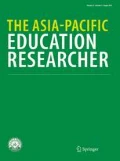Abstract
The purpose of this study was to examine the longitudinal causal relationship among Korean students’ past academic performance, self-efficacy beliefs, and academic achievement. The study used an autoregressive cross-lagged model to assess the casual ordering of self-efficacy beliefs and academic achievement in a representative sample of 1177 Korean students over a five-year period from the 8 to 12th grades. Results indicated that the academic performance of students from the first semester of the 8th grade positively predicted self-efficacy beliefs for the second semester of the 8th grade and that self-efficacy beliefs from the second semester of the 8th grade positively predicted the academic achievement of students for the first semester of the 9th grade; this pattern evidenced through to the 12th grade. A reciprocal relationship between self-efficacy beliefs and academic achievement was seen, such that the effect of past academic performance on self-efficacy beliefs was larger than the effect of selfefficacy beliefs on academic achievement. These findings point to the importance of integrating the reciprocal model into practice and utilizing interventions delivered by educators, school counselors, and school psychologists that target both self-efficacy and academic achievement. Future research is needed to evaluate interventions designed to address both self-efficacy and academic achievement.

Similar content being viewed by others
References
Allison, P. D. (2003). Missing data techniques for structural equation models. Journal of Abnormal Psychology, 112(4), 545–557.
Bandura, A. (2001). Social cognitive theory: An agentive perspective. Annual Review of Psychology, 52(1), 1–26.
Bandura, A., Barbaranelli, C., Caprara, G. V., & Pastorelli, C. (2001). Self-efficacy beliefs as shapers of children’s aspirations and career trajectories. Child Development, 72(1), 187–206.
Bandura, A., & Jourden, F. J. (1991). Self-regulatory mechanisms governing the impact of social comparison on complex decision making. Journal of Personality and Social Psychology, 60(6), 941–951.
Bandura, A., & Locke, E. A. (2003). Negative self-efficacy and goal effects revisited. Journal of Applied Psychology, 88(1), 87–99.
Bandura, A., & Wood, R. (1989). Effect of perceived controllability and performance standards on self-regulation of complex decision making. Journal of Personality and Social Psychology, 56(5), 805–814.
Bong, M. (1998). Tests of the internal/external frames of reference model with subject-specific academic self-efficacy and frame-specific academic self-concepts. Journal of Educational Psychology, 90(1), 102–110.
Bong, M. (2001). Between- and within-domain relations of academic motivation among middle and high school students: self-efficacy, task-value, and achievement goals. Journal of Educational Psychology, 93(1), 23–34.
Bong, M. (2004). Academic motivation in self-efficacy, task value, achievement goal orientations, and attributional beliefs. The Journal of Educational Research, 97(6), 287–297.
Brigman, G., Campbell, C., & Webb, L. (2004). Student success skills: Group counseling manual. Boca Raton, FL: Atlantic.
Brown, S. D., Tramayne, S., Hoxha, D., Tenlander, K., Fan, X., & Lent, R. W. (2008). Social cognitive predictors of college students’ academic performance and persistence: A meta-analytic path analysis. Journal of Vocational Behavior, 72(3), 298–308.
Caprara, G. V., Vecchione, M., Alessandri, G., Berbino, M., & Barbaranelli, C. (2011). The contribution of personality traits and self-efficacy beliefs to academic achievement: A longitudinal study. British Journal of Educational Psychology, 81(1), 78–96.
Cheung, G. W., & Rensvold, R. B. (2002). Evaluating goodness-of-fit indexes for testing measurement invariance. Structural Equation Modeling, 9(2), 233–255.
Chong, W. H., & Liem, G. A. D. (2014). Self-related beliefs and their processes: Asian insights. Educational Psychology: An International Journal of Experimental Educational Psychology, 34(5), 529–537.
Finkel, S. (1995). Causal analysis with panel data. Thousand Oaks, CA: Sage.
Hair, J. F., Black, B., Babin, B., Anderson, R. E., & Tatham, R. L. (2006). Multivariable data analysis (6th ed.). Upper Saddle River, NJ: Prentice-Hall.
Heggestad, E. D., & Kanfer, R. (2005). The predictive validity of self-efficacy in training performance: Little more than past performance. Journal of Experimental Psychology: Applied, 11(2), 84–97.
Komarraju, M., & Nadler, D. (2013). Self-efficacy and academic achievement: why do implicit beliefs, goals, and effort regulation matter? Learning and Individual Differences, 25(1), 67–72.
Lane, J., Lane, A. M., & Kyprianou, A. (2004). Self-efficacy, self-esteem and their impact on academic performance. Social Behavior & Personality: An International Journal, 32(3), 247–256.
MacCallum, R. C., Browne, M. W., & Cai, L. (2006). Testing differences between nested covariance structure models: power analysis and null hypotheses. Psychological Methods, 11(1), 19–35.
Multon, K. D., Brown, S. D., & Lent, R. W. (1991). Relation of self-efficacy beliefs to academic outcomes: A meta-analytic investigation. Journal of Counseling Psychology, 38(1), 30–38.
Pitts, S. C., West, S. G., & Tein, J.-Y. (1996). Longitudinal measurement models in evaluation research: examining stability and change. Evaluation and Program Planning, 19(4), 333–350.
Robbins, S. B., Lauver, K., Le, H., Davis, D., Langley, R., & Carlstrom, A. (2004). Do psychosocial and study skill factors predict college outcomes? Psychological Bulletin, 130(2), 261–288.
Vancouver, J. B., Thompson, C. M., & Williams, A. A. (2001). The changing signs in the relationships between self-efficacy, personal goals, and performance. Journal of Applied Psychology, 86(4), 605–620.
Wigfield, A., Eccles, J. S., Schiefele, U., Roeser, R., & Davis-Kean, P. (2006). Development of achievement motivation. In W. Damon & N. Eisenberg (Eds.), Handbook of child psychology: Vol. 3. Social, emotional, and personality development (6th ed., pp. 933–1002). New York: Wiley.
Zimmerman, B. J., & Bandura, A. (1994). Impact of self-regulatory influences on writing course attainment. American Educational Research Journal, 31(4), 845–862.
Author information
Authors and Affiliations
Corresponding author
Appendix 1
Appendix 1
Self-Efficacy Questionnaire
-
1.
I am confident of my own decision.
-
2.
I believe that I will successfully overcome challenges in my life.
-
3.
I am certain that I am dealing effectively with many tasks in my life.
-
4.
I think that I am a competent person.
-
5.
I give up on my tasks immediately if the tasks to be completed are difficult.
-
6.
I am not interested in and do not come up with schoolwork.
Rights and permissions
About this article
Cite this article
Hwang, M.H., Choi, H.C., Lee, A. et al. The Relationship Between Self-Efficacy and Academic Achievement: A 5-Year Panel Analysis. Asia-Pacific Edu Res 25, 89–98 (2016). https://doi.org/10.1007/s40299-015-0236-3
Published:
Issue Date:
DOI: https://doi.org/10.1007/s40299-015-0236-3




